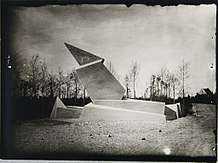Monument to the March Dead
Monument to the March Dead (German: Denkmal für die Märzgefallenen) is an expressionist monument in the Weimar Central Cemetery in Weimar, Germany memorializing workers killed in the Kapp Putsch. A 1920 design produced by Walter Gropius in collaboration with Fred Forbát was selected from those submitted in a competition organized by the Union Cartel and Städtisches Museum Weimar.[1][2][3]
| Denkmal für die Märzgefallenen | |
 | |
| Location | Historical Cemetery, Weimar, Germany |
|---|---|
| Designer | Walter Gropius |
| Material | concrete |
| Dedicated to | Workers killed in the Kapp Putsch |
| Dismantled date | 1936 |
The structure was built between 1920 and 1922.[4] An unveiling ceremony for the memorial was held on May 1, 1922.[2]
Motivated by political disagreement and the concept of degenerate art, the Nazis destroyed the monument in February 1936.[4]
The structure was reconstructed in 1946.[2]
Architecture
The form of the monument alludes to a thunderbolt. The structure is constructed of concrete.[5]
Reception
Theo van Doesburg, leader of the De Stijl movement was vocally critical of Gropius' expressionist design, decrying it as "the result of a cheap literary idea."[6]
Gallery
 Opening ceremony of the monument
Opening ceremony of the monument_1980%2C_MiNr_2510.jpg) The monument depicted on a 1980 stamp from East Germany
The monument depicted on a 1980 stamp from East Germany The structure in 2010 in its current form
The structure in 2010 in its current form
References
- Weibel, Peter (2005-05-17). Beyond Art: A Third Culture: A Comparative Study in Cultures, Art and Science in 20th Century Austria and Hungary. Springer Science & Business Media. ISBN 9783211245620.
- Gilbert Lupfer & Paul Sigel, Walter Gropius, 1883–1969: the promoter of a new form, p. 31.
- "Mock-up 'Monument to the Victims of the March Putsch'". www.bauhaus100.com. Retrieved 2019-10-01.
- Wolfe, Ross (2015-05-08). "Walter Gropius, Monument to the March Dead (1922)". The Charnel-House. Retrieved 2019-03-14.
- Saval, Nikil (2019-02-04). "How Bauhaus Redefined What Design Could Do for Society". The New York Times. ISSN 0362-4331. Retrieved 2019-03-14.
- MacCarthy, Fiona (2019-05-10). Gropius: The Man Who Built the Bauhaus. Harvard University Press. ISBN 9780674239906.